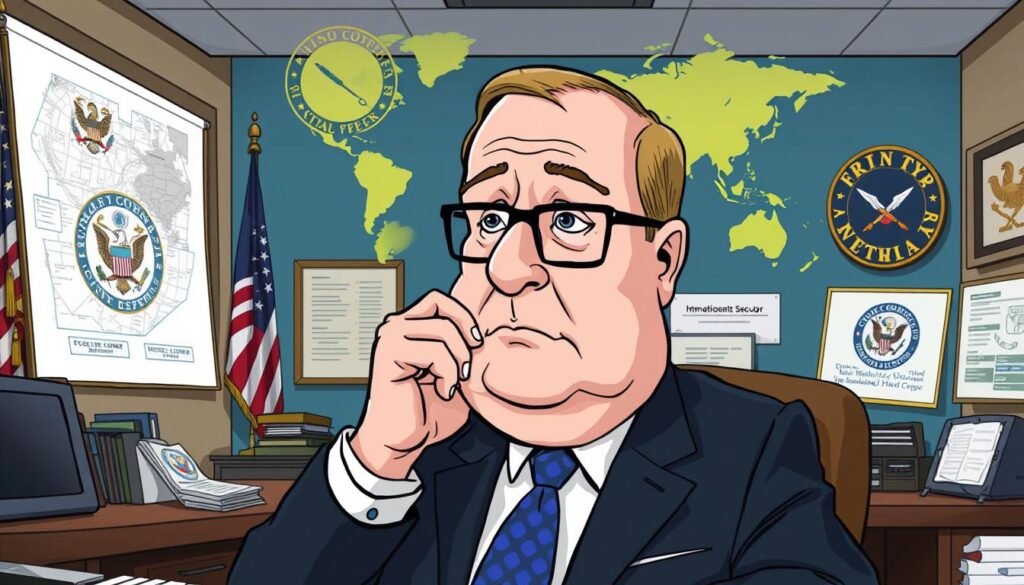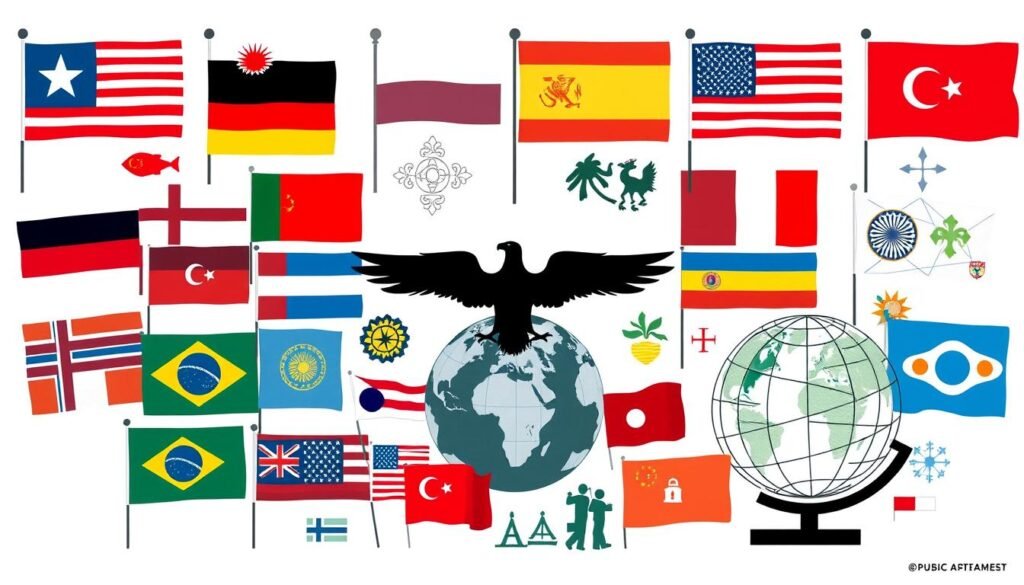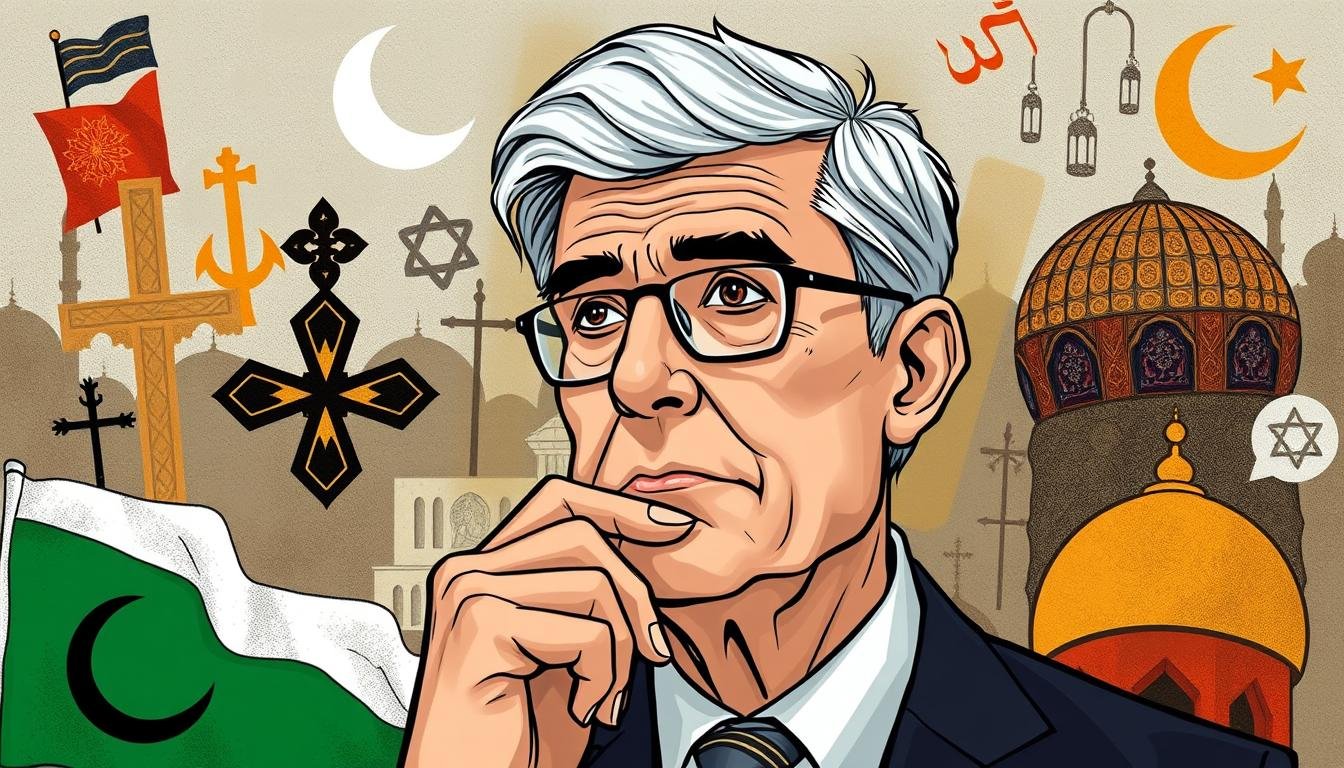John Brennan, the former CIA Director, has sparked many debates about his faith and Muslim identity. But what if I told you that wondering if John Brennan is Muslim goes beyond his personal beliefs? It also touches on how we see Islam after 9/11.
In a world filled with guesses about people’s faith, Brennan’s words and actions in U.S. intelligence are key. By looking at real sources and his career, we can clear up the confusion. This helps us understand how society views him and Islam.
Background of John Brennan
John Brennan’s life is filled with important experiences and achievements. These have shaped his career and his role in U.S. national security. This section looks at his early life and education, setting the stage for his long career in the CIA.
Early Life and Education
John Brennan was born on September 22, 1955, in North Bergen, New Jersey. He started his education at Fordham University. There, he got a Bachelor of Arts in political science in 1977.
His love for government and international relations led him to more studies. He got a Master’s degree in government from the University of Texas at Austin in 1980. Brennan spent a year at the American University in Cairo, learning Arabic and gaining insights into Middle Eastern cultures.
Career in the CIA
John Brennan’s CIA career lasted 25 years, starting right after college. He worked in many intelligence roles, helping with key operations in the Middle East. He was the CIA station chief in Riyadh, Saudi Arabia, for a while.
His background and language skills were crucial in understanding the complex geopolitical scene. By the end of his career, Brennan was a key figure in U.S. intelligence. He helped shape national security policies and strategies.
John Brennan’s Role in U.S. National Security
John Brennan has been key in shaping U.S. national security for 20 years. He worked in two big administrations, making big changes in how we fight terrorism. His work has helped keep America safe at home and abroad.
Position as Deputy National Security Advisor
As Deputy National Security Advisor, Brennan focused on fighting terrorism. He worked hard to understand and fight terrorist threats. He also worked to build trust with Muslim communities, aiming to stop extremism together.
Tenure as CIA Director
Later, Brennan became CIA Director. He led important spy missions that helped keep America safe. His leadership was important, even when he faced criticism. His time at the CIA is a big part of his legacy.

Speculations on John Brennan’s Faith
John Brennan’s faith has sparked a lot of talk, especially about his supposed conversion to Islam. As a well-known figure in the intelligence world, these rumors spread fast. They grew stronger after he worked in Saudi Arabia in the 1990s.
People started talking about his conversion because of his comments on the Islamic pilgrimage to Mecca.
Allegations of Conversion to Islam
In February 2013, rumors spread that John Brennan was a Muslim who converted in Saudi Arabia. These claims came up when he was nominated as CIA Director. Lawmakers and critics questioned his loyalty and faith.
Former FBI agent John Guandolo helped spread these rumors. He has a shady past, having resigned from the FBI. Guandolo made unfounded claims, making people doubt Brennan.
Comments on Islamic Practices
Brennan’s words about Islamic practices have added to the debate about his conversion. He talked about Islamic culture in a thoughtful way. This contrasts with the usual one-sided media coverage.
Despite rumors, Brennan swore on the U.S. Constitution during his swearing-in. This shows his commitment to the country, not his faith. There’s no solid proof that Brennan is a Muslim. Yet, these rumors highlight society’s fears and tensions about faith, loyalty, and identity.
Public Statements and Policy Positions
John Brennan has shared many views on national security and counterterrorism. He talks about the need to understand terrorism well. He says it’s key to know the difference between real Islamic teachings and extremist acts.
His clear views on terrorism help start important conversations. These talks are vital for our safety and understanding.
Brennan’s Views on Terrorism and Jihad
Brennan says fighting terrorism isn’t a war against Islam. He believes the word “jihad” is wrongly used by extremists. This view helps change how people see Muslim communities.
He wants to show that fighting terrorism doesn’t mean fighting a religion. This shows his commitment to fair counterterrorism policies.
How Brennan Engages with Muslim Communities
Brennan believes in working closely with Muslim communities. He thinks building good relationships helps fight stigma and work together on security. Through his words, he stresses the importance of respect and understanding.
He sees working with Muslim communities as key to stopping radicalization. It’s also important for peace.

Is John Brennan Muslim?
The question, Is John Brennan Muslim, sparks a deep debate. It touches on faith identity and how people see him. As a former CIA Director, Brennan’s past is often checked, leading to guesses about his faith. It’s key to separate facts from guesses.
Some think his work in the Middle East and language skills hint at Islam. But, there’s no solid proof he’s Muslim.
Looking at Brennan’s faith, we must think about his early life and education. He was born in North Bergen, New Jersey, in 1955. He studied political science at Fordham University and got a Master’s in Middle Eastern studies.
His studies and career show a deep interest in world affairs. This interest leads to confusion and guesses about his faith.
The ongoing talks about Is John Brennan Muslim show big issues in American society. These issues are about faith and how we see each other. We should stick to what we know about Brennan’s life and work. This helps avoid wrong ideas about faith in our diverse society.
Support for Non-Violent Interpretations of Islam
John Brennan believes in the power of non-violent Islam. This view matches U.S. efforts to fight terrorism. He sees religious leaders as key in building peace and fighting extremism.
In recent years, the U.S. government has started to see the value of religious groups. They help fight violent extremism. This shift led to the creation of the Office of Religion and Global Affairs.
Addressing Extremism in Counterterrorism Policy
The term “countering violent extremism” (CVE) has become key in fighting radicalization. Brennan wants to change how people see Muslims. He believes most Muslims are peaceful, not violent.
But, there’s a big challenge. Policies sometimes link Muslim identity with extremism. This makes things harder.
Reactions from the Muslim Community
People in the Muslim community have mixed feelings about Brennan’s views. Many like his message of peace and inclusion. They see it as a way to bring different faiths together.
But, others are worried. They feel U.S. policies unfairly target American Muslims. This makes it hard to have the dialogue Brennan wants. It shows the need for more talks about these issues.
Context of Brennan’s Notable Speeches
John Brennan’s words have shaped how we see the U.S. fight against terrorism. His 2010 speech at the Center for Strategic and International Studies was key. He made it clear that most Muslims are peaceful, not violent.
He called them “True Muslims.” This was a big step in fighting extremism. Brennan said this violence goes against Islam’s true teachings.
2010 Speech on “True Muslims” vs. Extremists
In this important speech, Brennan changed how people see Islam. He said most Muslims don’t support violence. This was a big part of the U.S. fight against terrorism.
By talking about peaceful Muslims, Brennan showed their role in fighting extremism.
Brennan’s words show a shift in how leaders view Islam. They now see the need to understand its true nature. This helps fight violence and build trust with Muslim communities worldwide.
His 2010 speech is a key part of ongoing talks about Islam and terrorism. For more on Brennan’s views, check out this analysis.
Criticism and Controversy Surrounding Brennan
John Brennan’s time as CIA Director faced a lot of Brennan criticism. Security analysts and political groups spoke out. They said his way of fighting terrorism is wrong. They think he doesn’t see the religious reasons behind terrorism.
This has led to security analysts allegations. They say Brennan’s methods won’t stop extremist groups. They worry about the U.S. strategies he supports.
Allegations from Security Analysts
These criticisms are real and based on his policies. Analysts say Brennan’s views on jihad are wrong. They think he makes people see terrorism as just a political issue, not a religious one.
For more on his views, check out the investigative work on jihad and Islam. It helps understand the ongoing debates about him.
Public Backlash on His Statements
The public has reacted strongly to Brennan’s words. Both his supporters and critics have spoken out. His efforts to talk to Muslim communities have raised questions.
Some worry his views on Islam might hide real problems with extremism. Misunderstandings about his faith have made things even more complicated. This has led to a mix of opinions on national security and fighting terrorism.
It’s important to look at the history and misinformation that shaped Brennan’s image. This includes false claims about his religious identity.
FAQ
Is John Brennan Muslim?
What is John Brennan’s educational background?
What roles did John Brennan hold within the CIA?
What were Brennan’s responsibilities as Deputy National Security Advisor?
What allegations have been made about John Brennan’s faith?
How has Brennan discussed terrorism and Islam in his public speeches?
What engagement has Brennan had with Muslim communities?
How has John Brennan contributed to discussions about non-violent interpretations of Islam?
What was the key message of Brennan’s 2010 speech at the Center for Strategic and International Studies?
What criticism has John Brennan faced regarding his views on terrorism?

Embracing Faith, One Insight at a Time!
The teachings of the Quran have always guided my path. With a deep passion for Islamic knowledge, I strive to blend the wisdom of tradition with the relevance of today, making the timeless messages of Islam accessible and meaningful for everyone.
Muslim Culture Hub is my platform to share historical insights and thought-provoking articles, exploring both well-known and lesser-discussed aspects of Islamic culture and beliefs. My mission is to create an inclusive online space where everyone can learn, strengthen their faith, and connect with the profound message of Islam.
Join the journey!
May peace be upon you.








